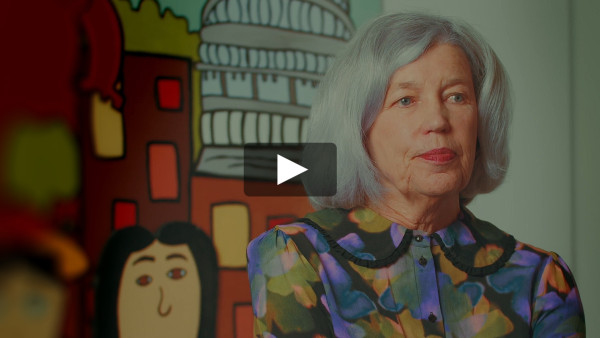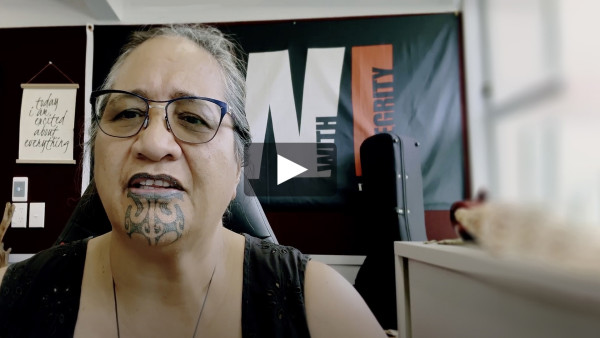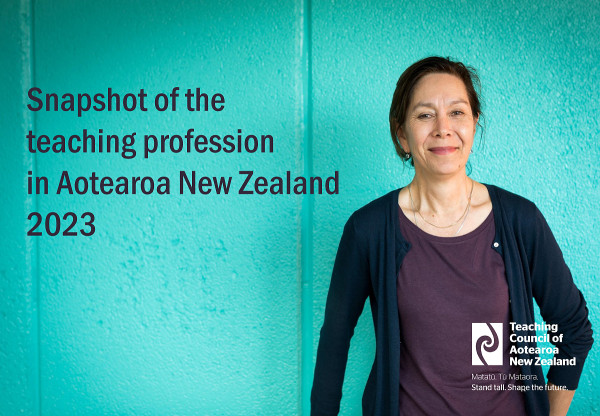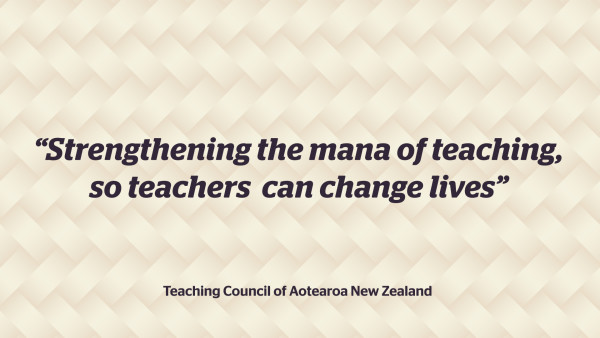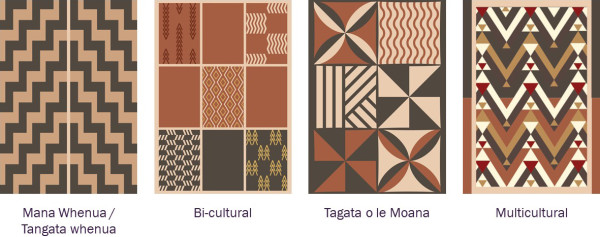CLOSED: Strategic Plan 2024-2029 - Consultation
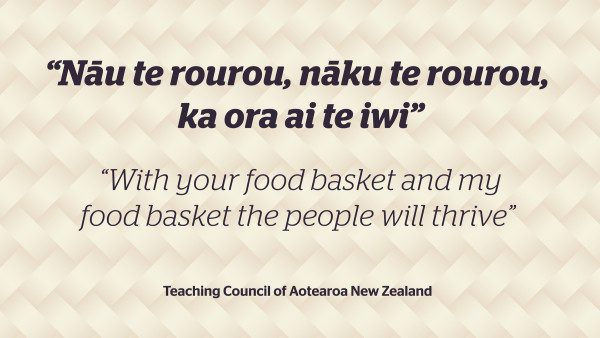
At a glance
- The consultation period starts from Tuesday 19 March and closes 5:00pm Friday 5 April.
- The Governing Council will consider all feedback before making a decision on the final Strategic Plan for 2024-2029.
- Hear from Governing Council Chair Robyn Baker - video English version
- Hear from Governing Council Deputy Chair Ripeka Lessels - video te Reo Māori version
- Read a summary of the research: Snapshot of the teaching profession in Aotearoa New Zealand 2023
Invitation to help shape our next strategic plan
We work for you - the teaching profession – we need your input to shape our strategic plan
Your fees and levy pay for most of our work. Most of this funding pays for ‘business as usual’. This includes obvious things like: registration and certification, approving initial teacher education programmes, managing conduct and competence cases and all the tech support and admin around these things.
Some less obvious areas include things like setting the requirements for initial teacher education and monitoring providers and updating the Examples in Practice for the Code of Professional Conduct. Some almost invisible things include working with other education sector bodies (like the Ministry of Education and New Zealand Qualifications Authority) and giving independent advice to Ministers.
The current strategic plan has a lot of details about our business-as-usual work, but it probably doesn’t mean a lot to you in your day-to-day work. We’ll keep doing the necessary ongoing work – and looking for ways to streamline and improve it. But we want our new plan to focus on a few big – strategic – things that we need to do to improve our work with and for you.
We know teachers don’t feel understood or supported – including by us
Times have been tough across many sectors in recent years. Independent research tells us that while most teachers love their job, many feel overworked, but undermined, under-paid and undervalued. And that we – your professional body – aren’t doing enough work that matters to you or being strong enough advocates for you.
We also found that the public generally has a high opinion of teachers and teaching. But they might not appreciate the skill and professionalism teachers bring to their role. And they might not see the importance of teaching for society in general.
Read the key research findings in this overview: Snapshot of the teaching profession in Aotearoa New Zealand 2023
So what are we going to do differently?
We’ve heard clear messages that we need to:
- Be more active and visible in speaking up for key issues for the teaching profession
- Build public understanding of the expertise of teachers
- Recognise the existing and emerging challenges teachers face
- Share teaching best-practice and grow leadership across the profession.
In summary, we need to step up and be more visible and effective in working for and with the teaching profession.
We’re suggesting a new vision statement and five high-level priorities to guide our next strategic plan. We need your input to finalise this – as you are the ones we are working for and your fees fund most of our work.
Our proposed five draft strategic priorities
We’ve developed five strategic priorities for us to focus on over the next five years to address the big issues identified by teachers.
What we want to work on with, and for you
|
Strategic priority |
Why we’ve chosen this – how this will help teachers |
Examples in practice |
|
Supporting teachers to manage current and emerging challenges in teaching |
Teaching has recently been affected by Covid, wild weather, and growing use of AI, and who knows what challenges are ahead. We also have a growing awareness of the diversity of learners in our schools and early childhood centres, and the importance of inclusive education. We need to ensure teachers are supported to keep up with and respond to key changes in society that affect their roles. |
Setting requirements for initial teacher education. Ensuring induction and mentoring of new teachers establishes a foundation for ongoing professional learning. Encouraging appropriate professional learning through the professional growth cycle and re-certification requirements. |
|
Communicating the value and expertise of teachers as professionals |
Teachers play a critical role in supporting a healthy well-functioning society. Not anyone can be a teacher – we need to demonstrate, celebrate and defend teachers’ unique skill sets and how teaching supports all our futures. |
Reflecting teacher views and concerns to the media and to decision-makers. Updating the Examples in Practice and improving conduct and competence processes. |
|
Growing leadership capability across the profession |
Teachers lead other teachers in many ways throughout their career – we need to facilitate opportunities for them to grow capability and learn from evidence-based practices and research. |
Building our suite of leadership resources and initiatives to collect and share examples of good practice for curriculum, subject and team leads. |
|
Developing leaders and principals to lead organisations [NB: this work is funded directly by government - not by teacher fees] |
We want well prepared and empowered Principals and ECE Professional leaders to lead their organisations. We are contracted to share effective leadership practice in practical ways, connect leaders, and provide oversight of the current leadership supports. Over time we will be able to identify overall leadership capability and areas for focus. Note we are not a PLD provider. |
Continuing to develop our Rauhuia and Unteach Racism resources. Co-ordinating formal leadership activities across the education sector. |
|
Building partnerships to reflect and embody our tangata Tiriti responsibilities |
All the Council’s work is underpinned by recognition of our responsibilities under Te Tiriti o Waitangi as Tiriti partners, and the accountability we have to all communities. |
Working with partners to develop pathways into initial teacher education for a more diverse workforce, including for Pacific-language speakers. |
Te Whare o te Matatū Aotearoa | House of the Teaching Profession
All the Council’s work is underpinned by recognition of our partnership responsibilities under Te Tiriti o Waitangi. We have illustrated this using a whare metaphor, which includes a depiction of our Tiriti partnership relationship using the tukutuku panels.

Ngā Pātū o te Whare | Wall of Identity
Ngā Pātū o te Whare reminds us of our responsibilities as Tiriti partners, and the accountability we have to all communities. This includes our responsibility to (amongst other things) support the protection and revitalisation of te reo Māori as a taonga for iwi, hapū and whānau and as a language integral to our national identity. It also provides space for us to respond to needs and aspirations of different communities as these are identified.
FAQs
What is in the current Strategic Plan?
Click here for the current Strategic Plan and here for the te Reo version
Didn’t we get consulted on this just a couple of years ago?
Yes, the current plan was published in 2022. We have to review our strategic plan at least every three years. The last review followed a long and difficult consultation around setting the new fees and levy rates. We’re moving the timetable forward by one year so we can focus completely on the big strategic issues. It also means we don’t have to consult you about the strategic plan, the fees and levy and Governing Council elections all in the same year.
The draft priorities are pretty high level - what happens to the business-as-usual work?
We will keep doing that, and looking for improvements and efficiencies – and we’ll show progress in our Annual Reports. We will also do a review of progress against our current strategic plan and publish that in due course.
What happens next?
We’ll collate and analyse your feedback and report-back to our Governing Council with key findings and suggested changes to our draft priorities. Then around the middle of this year, our Governing Council will publish a new strategic plan setting out our key strategic goals for the next five years.
How can I be involved in work to support my profession?
Most professions are self-regulating. That is, the members develop and uphold their professional standards, and our role is to facilitate and support. Many kaiako and leaders already contribute, for example:
- being on the Governing Council, or one of its Advisory Groups
- contributing to Complaints Assessment Committee, Competence Authority or Disciplinary Tribunal processes
- making recommendations as part of approval panels for initial teacher education
- being mentors for provisionally certificated teachers
- participating in symposia or focus groups on different topics
- engaged in Unteach Racism or Rauhuia activities
- professional leaders who can endorse a teacher’s practicing certificate
- reviews of policy and procedures e.g. the recent review of professional boundaries
- sharing feedback on key issues facing the teaching profession – helping us make submissions.

